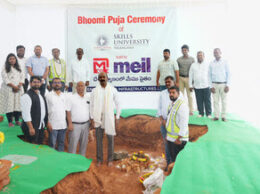The India education landscape is constantly evolving, driven by technological advancements, globalization, and unforeseen events like the Covid-19 pandemic. To address the challenges of the 21st century and equip students with skills for success, the National Education Policy 2020 (NEP-2020) has evolved as a promising tool. This policy is a progressive stride towards nurturing ’21st-century skills’ among students, including critical thinking, problem-solving, creativity, and digital literacy.
Beyond these foundational skills, the NEP-2020 holds the potential to significantly enhance students’ performance in competitive exams like CUET, UPSC, CAT, CLAT, etc., equipping them for a future marked by unprecedented transformations.
Redefining Education for 21st-Century Challenges
The NEP-2020 acknowledges that the traditional education model might no longer suffice to prepare students for the complexities of the modern world. Competitive exams, which play a pivotal role in determining one’s academic and professional trajectory, demand more than just rote memorization. The policy recognizes this reality and aims to cultivate analytical thinking, adaptability, and innovative problem-solving through experiential learning methods.
As students navigate the evolving landscape of education and the workforce, the NEP-2020 equips them with the skills and mindset required not just to clear competitive exams but to excel in various fields. By fostering a culture of innovation, adaptability, and interdisciplinary thinking, the policy lays the foundation for a generation of individuals ready to make a meaningful impact on both local and global scales. The implementation of the NEP-2020 in schools marks a significant step towards nurturing well-rounded individuals who are not only exam-ready but also future-ready.
Holistic Development: The NEP-2020 prioritizes the holistic development of students. By encouraging a multidisciplinary approach, students gain exposure to a diverse range of subjects. This not only expands their knowledge but also enhances their ability to connect concepts across disciplines – a skill crucial for competitive exams that often require interdisciplinary understanding.
Critical Thinking and Problem-Solving: Competitive exams demand analytical thinking and the ability to solve complex problems. The NEP-2020’s focus on critical thinking fosters the skills required to dissect problems, evaluate options, and arrive at effective solutions – skills that go beyond mere memorization.
Application of Knowledge: The policy emphasizes practical application of knowledge through hands-on learning and real-world experiences. This approach enables students to apply theoretical concepts in practical scenarios, a competence highly valued in competitive exams that often test the application of knowledge.
Digital Literacy: In an increasingly digital world, proficiency in technology is indispensable. The NEP-2020’s emphasis on digital literacy equips students with the skills to navigate online resources, conduct research, and adapt to digital exam formats, giving them a distinct advantage.
Flexibility and Choice: The policy offers students the freedom to choose subjects according to their interests and aptitudes. This personalized approach allows students to specialize in areas where they excel, increasing their chances of success in competitive exams tailored to those subjects.
Assessment Reforms: The NEP-2020 suggests moving away from the conventional exam-centric assessment system. Instead, it advocates for a continuous and comprehensive evaluation, reducing the undue pressure associated with high-stakes exams. This approach enhances students’ overall learning experience and prepares them for competitive exams with a focus on conceptual clarity.
Language Proficiency: The policy recognizes the importance of multilingualism. Proficiency in multiple languages not only enriches students’ cognitive abilities but also opens doors to a wider range of competitive exams and opportunities.
Conclusion
The NEP represents a transformative leap in Indian education, which is a positive step towards nation building and growth. By fostering critical thinking, problem-solving, creativity, digital literacy, and holistic development, the policy prepares students not only for the challenges of the 21st century but also for the rigors of competitive exams. The shift from rote learning to skill-based education aligns with the demands of modern competitive exams, where conceptual understanding and application are paramount.









